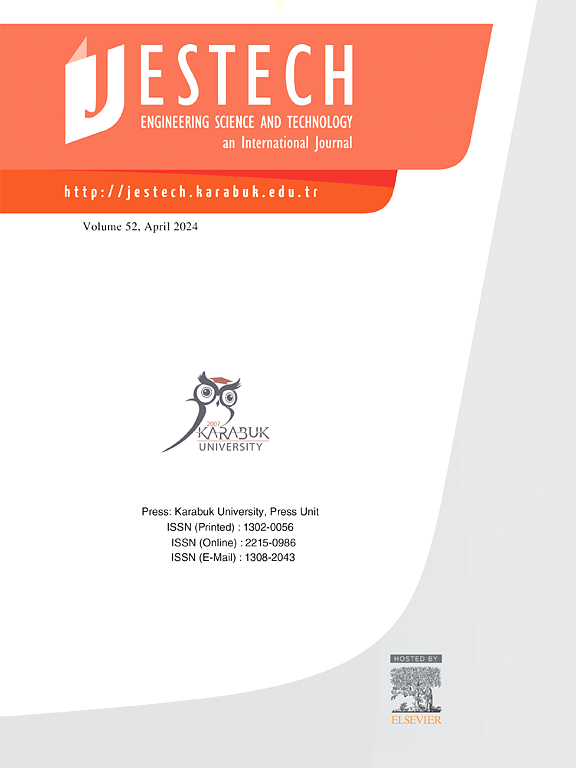6G移动网络中基于移动边缘计算的机器学习切换决策研究
IF 5.1
2区 工程技术
Q1 ENGINEERING, MULTIDISCIPLINARY
Engineering Science and Technology-An International Journal-Jestech
Pub Date : 2025-07-16
DOI:10.1016/j.jestch.2025.102131
引用次数: 0
摘要
即将到来的第六代(6G)蜂窝网络有望提供网络架构的新发展,提供更高的数据速率和超低延迟,确保为大量连接设备提供无缝可靠的连接和高质量的服务。尽管高效的切换决策是6G网络的关键挑战之一,特别是在高移动性场景和未来网络的复杂特征下。随着移动边缘计算(MEC)的实施,这种情况变得更加关键,由于其特性和高要求,这将导致移交决策过程更具挑战性。本文对6G网络中的MEC切换决策(HOD)进行了系统回顾,深入了解了6G移动网络中最常见的挑战和解决方案,解决了移动管理问题。此外,机器学习(ML)和深度学习(DL)技术是具有MEC的6G网络中智能hod制造的关键解决方案。因此,本研究工作也旨在重点研究和突出先进的机器学习方法,这些方法可用于通过MEC增强6G蜂窝网络中的hod制作。此外,本文还对基于hod的机器学习解决方案进行了全面回顾,以提高异构网络(HetNet)中用户体验的服务质量(QoS),从而增强了对本文研究结果的信心。此外,提出了基于下一代网络需求的机器学习模型和可能的技术解决方案。我们还描述了研究的挑战和未来的研究方向。本文章由计算机程序翻译,如有差异,请以英文原文为准。
Machine learning for handover decision with mobile edge computing in 6G mobile network: a survey
The forthcoming Six-Generation (6G) cellular network promises to provide novel developments in network architecture, offering greater data rates and ultra-low latency, ensuring seamless and reliable connectivity with a high quality of service for a massive number of connected devices. Even though efficient handover decision-making is one of the critical challenges in 6G networks, especially with high mobility scenarios and complex characterization of future networks. The case becomes more critical with the implementation of Mobile Edge Computing (MEC), which will lead to making the handover decision process more challenging due to its characterization and high requirements. This paper presents a systematic review of the handover decision (HOD) with MEC in 6G networks, providing a deep understanding of the most standing challenges and solutions addressing mobility management issues in 6G mobile networks. Moreover, machine learning (ML) and deep learning (DL) technologies are the key promising solutions for intelligent HOD-making in 6G networks with MEC. Therefore, this research work also aims to give a main focus on studying and highlighting the advanced ML methods that can be used to enhance HOD-making in 6G cellular networks with MEC. Furthermore, a comprehensive review of HOD-based ML solutions is provided to enhance the Quality of Service (QoS) of user experience in Heterogeneous Networks (HetNet), instilling confidence in the paper’s findings. Besides, proposed solutions for HODs using ML models with next-generation network requirements and possible technologies are presented. We also describe research challenges and future directions for achieving this study.
求助全文
通过发布文献求助,成功后即可免费获取论文全文。
去求助
来源期刊

Engineering Science and Technology-An International Journal-Jestech
Materials Science-Electronic, Optical and Magnetic Materials
CiteScore
11.20
自引率
3.50%
发文量
153
审稿时长
22 days
期刊介绍:
Engineering Science and Technology, an International Journal (JESTECH) (formerly Technology), a peer-reviewed quarterly engineering journal, publishes both theoretical and experimental high quality papers of permanent interest, not previously published in journals, in the field of engineering and applied science which aims to promote the theory and practice of technology and engineering. In addition to peer-reviewed original research papers, the Editorial Board welcomes original research reports, state-of-the-art reviews and communications in the broadly defined field of engineering science and technology.
The scope of JESTECH includes a wide spectrum of subjects including:
-Electrical/Electronics and Computer Engineering (Biomedical Engineering and Instrumentation; Coding, Cryptography, and Information Protection; Communications, Networks, Mobile Computing and Distributed Systems; Compilers and Operating Systems; Computer Architecture, Parallel Processing, and Dependability; Computer Vision and Robotics; Control Theory; Electromagnetic Waves, Microwave Techniques and Antennas; Embedded Systems; Integrated Circuits, VLSI Design, Testing, and CAD; Microelectromechanical Systems; Microelectronics, and Electronic Devices and Circuits; Power, Energy and Energy Conversion Systems; Signal, Image, and Speech Processing)
-Mechanical and Civil Engineering (Automotive Technologies; Biomechanics; Construction Materials; Design and Manufacturing; Dynamics and Control; Energy Generation, Utilization, Conversion, and Storage; Fluid Mechanics and Hydraulics; Heat and Mass Transfer; Micro-Nano Sciences; Renewable and Sustainable Energy Technologies; Robotics and Mechatronics; Solid Mechanics and Structure; Thermal Sciences)
-Metallurgical and Materials Engineering (Advanced Materials Science; Biomaterials; Ceramic and Inorgnanic Materials; Electronic-Magnetic Materials; Energy and Environment; Materials Characterizastion; Metallurgy; Polymers and Nanocomposites)
 求助内容:
求助内容: 应助结果提醒方式:
应助结果提醒方式:


